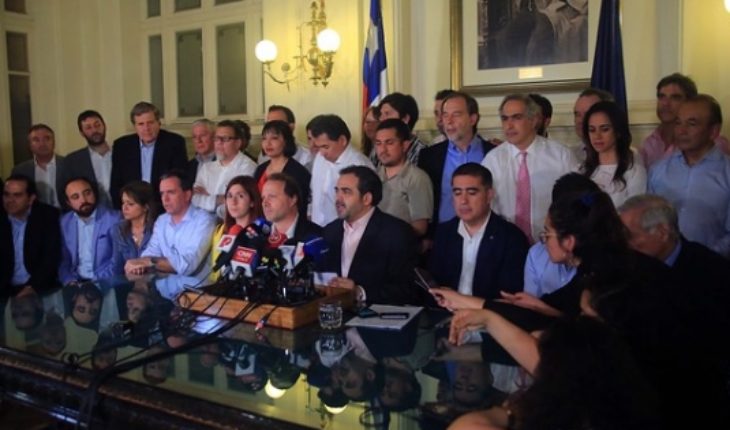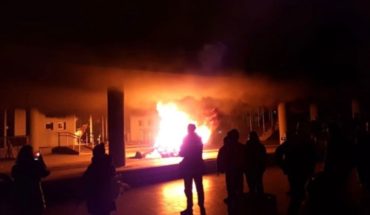The early-morning parliamentary agreement of 15 November, which extends to the public the possibility of deciding on an Assembly or Constituent Convention, represents an unprecedented advance. Although the self-reference of our professional politicians has placed the emphasis on their ability to reach consensus, the truth is that it is primarily an achievement of the largest social mobilization in recent history that paralyzed the normal functioning of the city for more than a month. This agreement, however, confronts us again with the old ghosts of the left: that in the face of democratic progress, the right is organized to avoid defeat while progressism unfolds in dissident voices and cross-accusations. Example of this was Allamand’s attempt to relativize the terms of the agreement recklessly while Social Convergence bleeds from the actions of an MP in a personal capacity.
Among the dissident voices, not a few argued that the agreement was negotiated in a kind of “kitchen”, behind the backs of the public. This idea has been debated profusely, under a somewhat arrogant exercise of “political pedagogical” that explains that the cooks were parliamentarians that we chose and that the kitchen was actually the National Congress, a space dedicated to the achievement of agreements. In this sense, discrediting a proposal because it was negotiated, in the National Congress, by parliamentarians in office and without objectively attending to its contents, I would say much more about the idea of democracy of those who condemn it than of the proposal as such. The above is true in most cases, mainly when the opinion comes from our representatives. It leaves us under the impression that, by pursuing absolute victories, one does not skimp on the risk of further discrediting today’s flimsy democratic exercise. In addition, those who fantasize about seeing the opposition or the social movement imposing (or more naively on the government accepting) conditions of surrender for a national agreement, even if in politics there are no absolute victories and everything that is intended as such stay out of it.
This trend is typical of this neoliberal left that Gumucio reminds us, which seeks to capitalize even if it is contrary to the institutional space that will make possible the social and political transformation of society. But it doesn’t all come down to this: it would be naive not to recognize the neutralizing amount of deliberation of those who sought 30 years to give a human face to neoliberalism, ultimately its most successful defenders, who in 2005 talked about a new constitution democratic to recognize 14 years later that there was always the same straitjacket. The cumulative deterioration in the ability to represent our political class explains well how we reach the present frontier between radical transformation or radical hopelessness, in which all politics appears to many as one great kitchen. From this border, defending progress before the right that seeks to relativize its terms and the tendency to capitalize uncrossed by certain frontline leaders is one and the same enterprise: safeguarding democratic politics as the only instrument of large-scale social transformation that social majorities have.
In the days ahead, it will be important to resolutely acknowledge the contribution of the mayors. If the erratic conduct of the President of the Republic in recent weeks has legitimized some parliamentaryism in the facts, the weakness of the state for decades has strengthened the active social role of the municipalities. Let us not forget that, while parliamentarians were building a horse-killer agreement in the middle of the night, the mayors had already reached a cross-cutting consensus several days earlier, in more transparent terms than those of “mixed convention or convention”. In these same municipalities, not only the consequences of inequality in the territories are addressed on a daily basis; there is also the uncertainty of the government’s failure to maintain public order, when many officials of Carabineros and Armed Forces, runaway and cowardly, chose to stoning the anger of neighborhoods.
We will not know whether the conduct of the process by the mayors had managed to rebuild trust with social organizations or leverage higher quotas of legitimacy among the public. Not if it was feasible, except if it had come to port. We do know that the democratizing impulse of municipalism can be entwined with the development of the truly existing constituent process (they have already shown this). The agreement has left loose ends, but no blank checks are available for any party, nor does it seem feasible to maintain the same levels of social mobilization (or at least the same means) for the next two years. During this period, municipal consultations can help maintain participation, prioritize the agenda of social reforms, collect citizens’ preferences on issues such as parity or other characteristics of the Assembly Constituent and even help resolve discrepancies that produce the process itself as in successful experiences of other countries.
Another benefit of municipalism and territorial participation is to more likely to address a widely spread feeling these days: fear of normality. For many, one of the great conflicts of resuming daily life is associated with maintaining the same uncertainty quotas as before October 18 on issues such as pensions, public health, indebtedness, education, minimum wages, security social, among others. For others, normality involves impunity for human rights violations, mutilations and numerous other abuses. Part of the rejection in networks and lobbyes of the agreement reached in the early morning of November 15 had to do with the attempt of the government of Sebastián Piñera to present it as the culmination of the mobilizations to make a blur and new account. In the interests of the success of the process itself, it will be important that this vision be discarded from the opposition and social movements together.
It will be a complex challenge to return to life in the city without minimal light on the changes that will contain the so-called social short agenda. To this end, municipalities, lobbyists and even the use of certain platforms will be able to collaborate in ordering the program that parliamentarians have failed to prioritize in months. For families who will miss a loved one, Chileans who lost their sight, all the wounded and all the vexed, the National Congress can also play a role in welcoming complaints and opening a justice and reparation agenda.
The parliamentary commitment is a start to several possible to channel this constituent moment. And, like any bet, it’s open to the shipwreck. Congress is not without the risks of oversize and attributing itself to today’s avoidability for all institutionality or officiating as a sovereign’s substitute, tempting to determine according to a logic constituted the results of a constituent process. That is why the task of rebuilding the bridges of representation will be subtle, far from amplloous discourses, as well as requiring the contest of all living forces of society. Perhaps so we can agree transversely, hopefully soon, that nothing has been in vain, that no one will be forgotten and that this is not only not over, but barely, and surrounded by a feeling of great paradox, has just begun.
The content poured into this opinion column is the sole responsibility of its author, and does not necessarily reflect the editorial line or position of El Mostrador.





